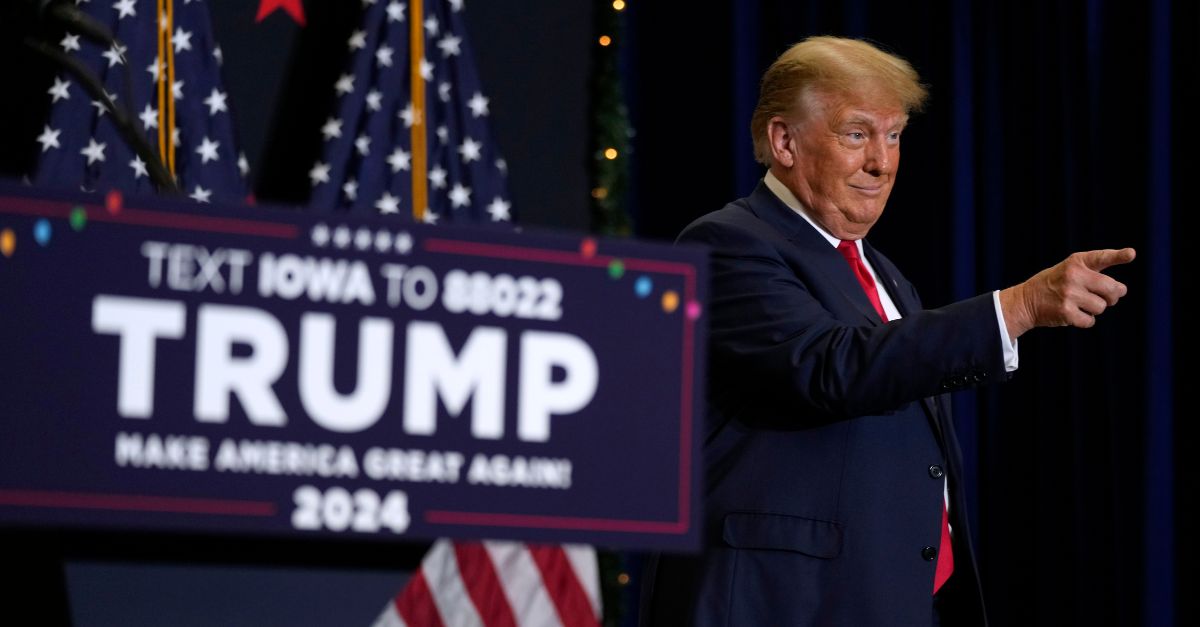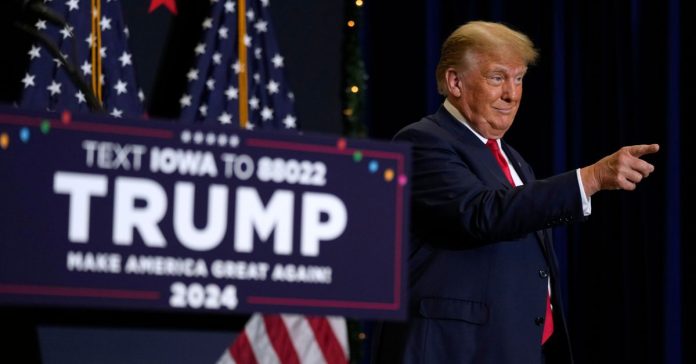
Former President Donald Trump greets supporters as he arrives at a commit to caucus rally, Tuesday, Dec. 19, 2023, in Waterloo, Iowa. (AP Photo/Charlie Neibergall)
Former President Donald Trump on Wednesday asked the U.S. Supreme Court to overturn the Colorado Supreme Court ruling that removed him from the state’s 2024 presidential primary ballot.
In late December, the Mile High State’s highest court ruled the 45th president’s actions on Jan. 6, 2021, at the U.S. Capitol, precluded him from running for president under Section Three of the Fourteenth Amendment to the U.S. Constitution, which bars candidates who have engaged in insurrection or rebellion from holding federal office.
In his 43-page petition for a writ of certiorari, Trump argues that, whatever he did on Jan. 6, he did not engage in insurrection.
“In the context of the history of violent American political protests, January 6 was not insurrection and thus no justification for invoking section 3,” the petition reads. “Moreover, nothing that President Trump did ‘engaged’ in ‘insurrection.’ President Trump never told his supporters to enter the Capitol, either in his speech at the Ellipse or in any of his statements or communications before or during the events at the Capitol.”
The brief seeks to contrast Trump’s behavior at the Stop the Steal rally, which was held at a park just south of the White House called The Ellipse, with a multiple-week-long Black Lives Matter protest at the Portland, Oregon. There, Trump argues, “violent protesters” repeatedly “assaulted federal officers and set fire to the courthouse.”
Trump argued he told his supporters to remain and stay peaceful — and to protest “peacefully and patriotically.”
The filing also contains the following short foray into the history of the context in which the provision at issue was drafted:
“Insurrection” as understood at the time of the passage of the Fourteenth Amendment meant the taking up of arms and waging war upon the United States. When considered in the context of the time, this makes sense. The United States had undergone a horrific civil war in which over 600,000 combatants died, and the very survival of the nation was in doubt. Focusing on war-making was the logical result.
Trump also implored the nine justices to rule that the question is one specifically reserved for Congress — not a state’s high court.
“The question of eligibility to serve as President of the United States is properly reserved for Congress, not the state courts, to consider and decide,” the brief reads. “By considering the question of President Trump’s eligibility and barring him from the ballot, the Colorado Supreme Court arrogated Congress’ authority.”
In its landmark Dec. 19, 2023, ruling, the Colorado court ruled 4-3 to exclude Trump on the basis that he was an officer of the United States at the time of the riot at the U.S. Capitol Complex. A lower court had previously found that Trump committed insurrection — but declined to rule on whether or not he was an officer, which is a textual requirement of the insurrectionist ban.
Trump’s attorneys reprised that dispute in the petition, arguing that Section 3 simply does not apply to the U.S. presidency.
“It does not list the presidency,” the filing goes on — referring to the section at issue. “Moreover, it lists offices in descending order, beginning with the highest federal officers and progressing to the catchall term ‘any office, civil or military, under the United States.’ Thus, to find that section 3 includes the presidency, one must conclude that the drafters decided to bury the most visible and prominent national office in a catchall term that includes low ranking military officers, while choosing to explicitly reference presidential electors. This reading defies common sense and is not correct.”
Read Trump’s petition in full below:
Have a tip we should know? [email protected]

